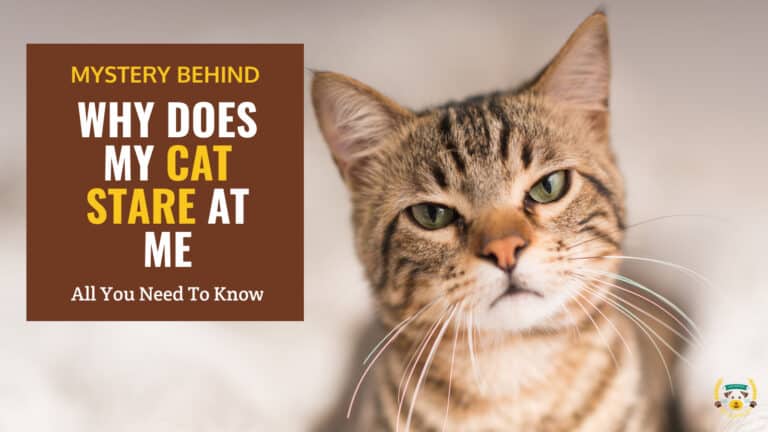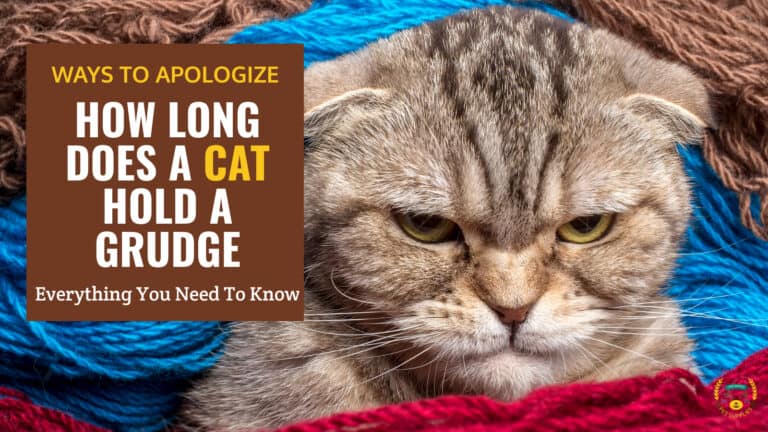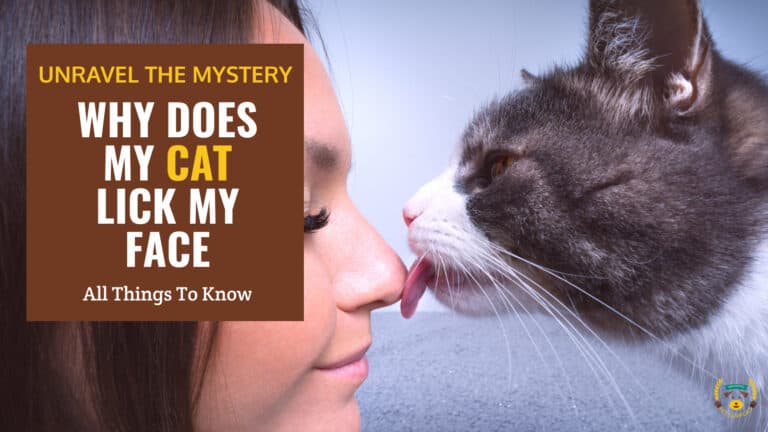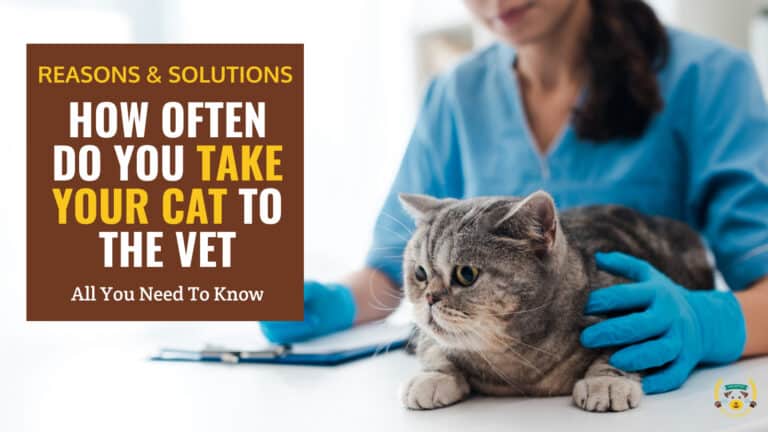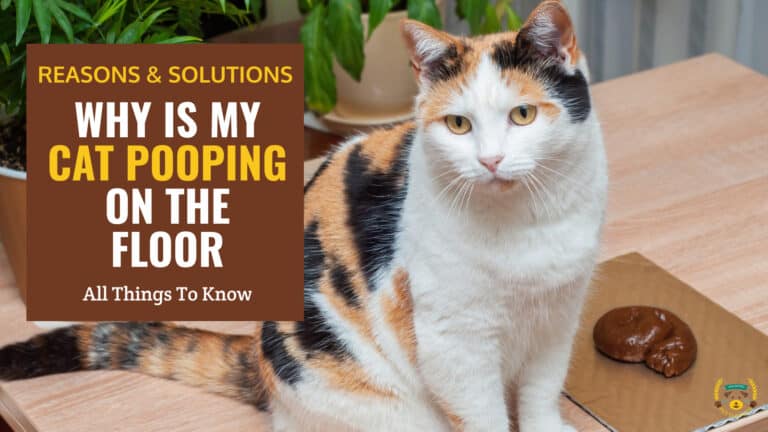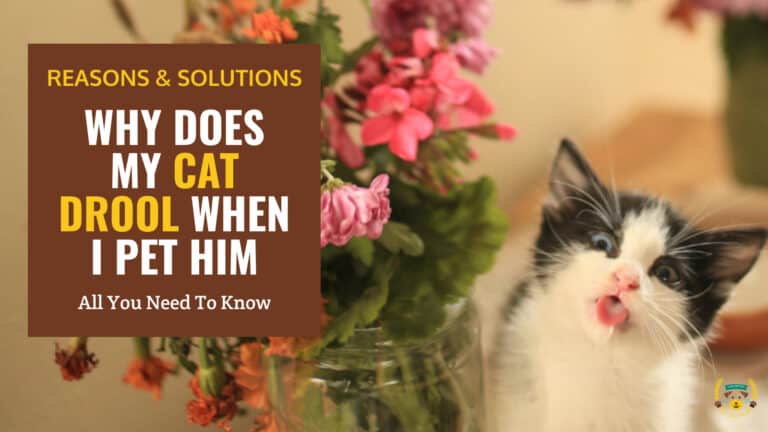Why Is My Cat Throwing Up Undigested Food?
Last updated: March 15, 2024
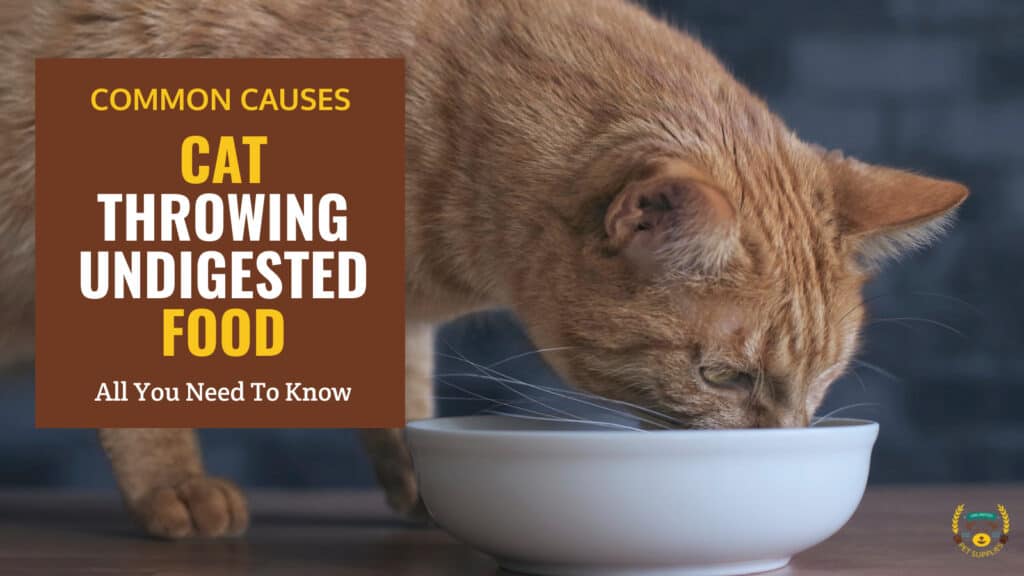
Summary
- Common causes: eating too fast, hairballs, food allergies, digestive disorders, parasites, foreign objects.
- See vet if: vomiting is frequent (>1 week), lasts over 24 hours, or accompanied by lethargy, loss of appetite, diarrhea, weight loss.
- Especially consult vet for: kittens, senior cats, cats with pre-existing conditions.
- Diagnosis: physical exam, blood tests, fecal analysis, imaging, endoscopy.
- Treatment: dietary changes, medication, surgery (rare).
- Prevention: proper diet, grooming, parasite control, stress reduction, regular vet check-ups.
Identifying the cause of undigested food in your cat's vomit is crucial for determining the most effective course of action to alleviate their discomfort and prevent further digestive issues. Various reasons, ranging from dietary factors to medical conditions, may be behind your cat's digestive distress.
In this article, we'll explore common causes, when to be concerned, diagnostic methods, treatment options, and prevention strategies. By gaining a deeper understanding of your cat's digestive health, you'll be better equipped to provide it with the care and support it needs to feel better.
- 1) Common Reasons for Cats Throwing Up Undigested Food
- 2) When to Be Concerned?
- 3) Diagnostic Methods
- 4) Treatment Options
- 5) Prevention Strategies
-
6)
Frequently Asked Questions
- 6.1) How can I tell if my cat is throwing up or coughing up a hairball?
- 6.2) Should I withhold food from my cat after they vomit?
- 6.3) Can a change in diet cause my cat to throw up undigested food?
- 6.4) Is it normal for kittens to throw up more often than adult cats?
- 6.5) Can stress lead to my cat throwing up undigested food?
- 7) Final Thoughts
Common Reasons for Cats Throwing Up Undigested Food
Several factors can cause your cat to vomit undigested food. Understanding these reasons helps you identify the issue and take appropriate action.
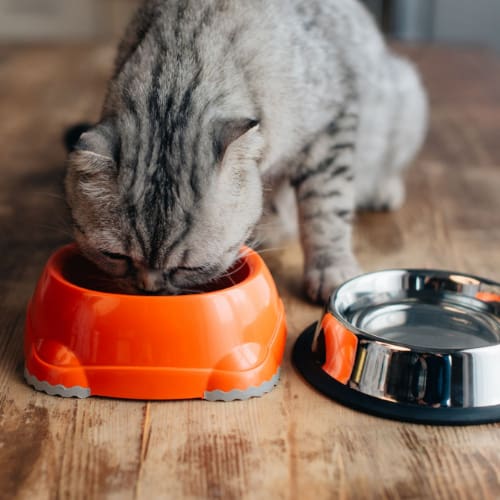
Eating Too Quickly
Cats that eat too fast often swallow large chunks of food without proper chewing. Their digestive system struggles to break down these pieces, leading to vomiting.
If your cat eats rapidly, consider using puzzle feeders or splitting meals into smaller portions to slow them down.
Hairballs
Cats groom themselves frequently, and in the process, they ingest loose fur. When this hair accumulates in the stomach, it forms hairballs that can cause irritation and vomiting.
Sometimes, undigested food accompanies hairballs in the vomit.
Food Allergies or Intolerances

Like humans, cats can develop allergies or intolerances to certain ingredients in their food. Common allergens include beef, dairy and fish.
If your cat's digestive system reacts negatively to a particular food, it may result in vomiting undigested portions of their meal.
Gastrointestinal Disorders
Some gastrointestinal disorders like Inflammatory Bowel Disease and Gastroenteritis can cause vomiting in your cat.
Inflammatory Bowel Disease (IBD)
IBD is a chronic condition that causes inflammation in the digestive tract. Cats with IBD may experience frequent vomiting episodes, including the expulsion of undigested food. Other symptoms include diarrhea, weight loss, and decreased appetite.
Gastroenteritis
Gastroenteritis refers to the inflammation of the stomach and intestines. It can be caused by viral or bacterial infections, parasites or ingestion of toxic substances. Vomiting undigested food is a common symptom of gastroenteritis in cats.
Parasitic Infections
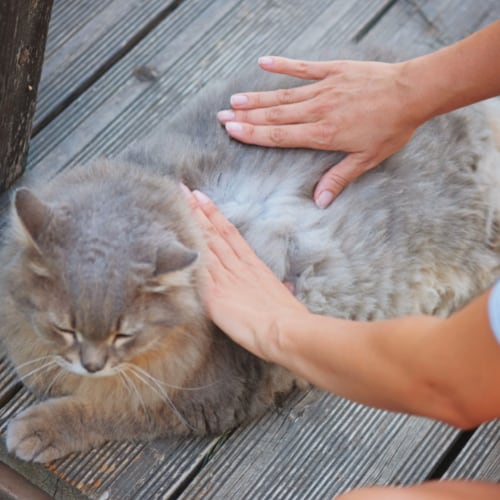
Internal parasites, such as roundworms and tapeworms, can disrupt your cat's digestive process. These parasites compete for nutrients and cause inflammation, leading to vomiting of undigested food. Regular deworming helps prevent and control parasitic infections.
Foreign Objects
Cats are curious creatures and may ingest non-food items like string, toy parts, or plant material. When these objects get stuck in the digestive tract, they can cause blockages and irritation, resulting in vomiting. In some cases, surgery may be necessary to remove the foreign object.
Keep an eye out for accompanying symptoms and consult your veterinarian for an accurate diagnosis and appropriate treatment plan.
When to Be Concerned?
While occasional vomiting may not be a cause for alarm, certain situations warrant a closer look and possibly a visit to the vet.
Pay attention to your cat's overall health and behavior to determine if their vomiting is a sign of a more serious issue.
Frequency and Duration of Vomiting Episodes
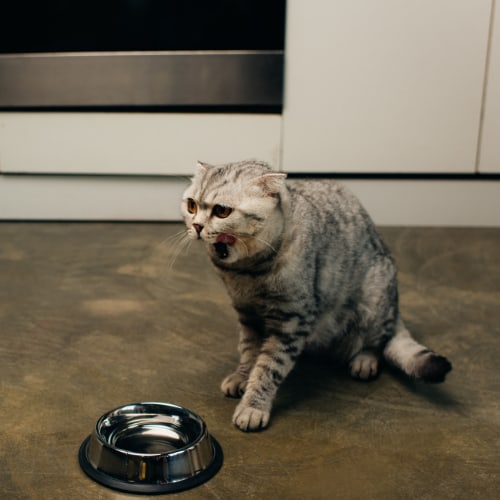
If your cat vomits once or twice but then resumes normal eating and drinking habits, it may just be a minor digestive upset.
However, if the vomiting persists for more than 24 hours or occurs frequently (more than once a week), it's time to consult your veterinarian.
Accompanying Symptoms
When vomiting is accompanied by other symptoms, it may indicate a more severe health problem. Watch for the following signs:
Lethargy
If your cat seems unusually tired, weak, or disinterested in their surroundings, it could be a sign of an underlying illness causing the vomiting.
Loss of Appetite
Cats that refuse to eat or show a decreased interest in food for more than 24 hours should be evaluated by a vet, especially if vomiting is also present.
Diarrhea
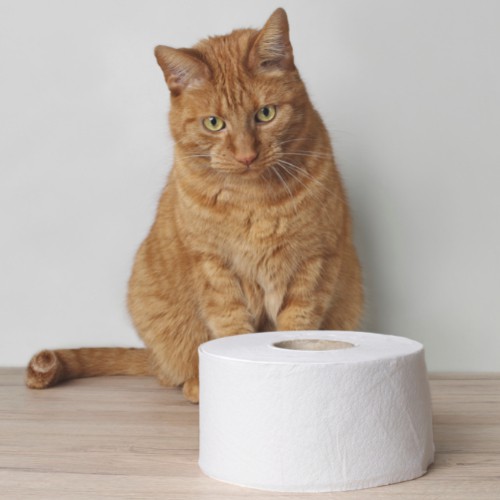
Concurrent vomiting and diarrhea can quickly lead to dehydration, which can be dangerous for cats. If your cat experiences both symptoms, contact your veterinarian promptly.
Weight Loss
Unexpected weight loss, particularly when combined with vomiting, may suggest a chronic condition that requires medical attention.
Age and Overall Health of Your Cat
Kittens, cats, and those with pre-existing health conditions are more susceptible to complications from vomiting.
If your cat falls into one of these categories and experiences vomiting episodes, it's best to be on the safe side and consult your vet.
Diagnostic Methods
If your cat's vomiting raises concerns, your veterinarian will employ various diagnostic methods to identify the underlying cause. These tests provide valuable insights into your cat's health and help determine the most effective treatment plan.
Physical Examination
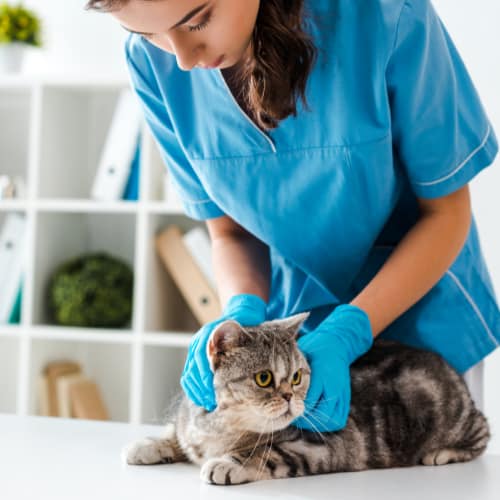
Your vet will begin with a thorough physical exam, checking your cat's vital signs, palpating their abdomen, and assessing their overall condition.
They may also inquire about your cat's diet, eating habits, and any recent changes in behavior or environment.
Blood Tests
Blood work, including a complete blood count (CBC) and a biochemical profile, can reveal signs of infection, inflammation, organ dysfunction, or other abnormalities that may be contributing to your cat's vomiting.
Fecal Analysis
Examining a stool sample can help detect the presence of parasites, bacteria, or other gastrointestinal pathogens that may be causing digestive upset and vomiting.
Imaging Techniques
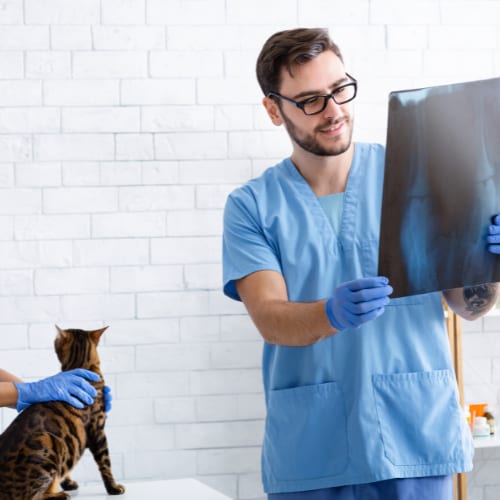
Abdominal radios (using X-rays) can help visualize foreign objects, obstructions or abnormalities in your cat's digestive tract that may be causing the vomiting.
In addition, ultrasound provides a more detailed view of your cat's internal organs, allowing your vet to identify intestinal thickening, tumors or other structural changes that may not be visible on X-rays.
Endoscopy
In some cases, your vet may recommend an endoscopy, a procedure that involves inserting a small camera into your cat's digestive tract. This allows for a direct visual examination of the esophagus, stomach and intestines, as well as the opportunity to collect tissue samples for biopsy.
Your veterinarian will determine which diagnostic tests are necessary based on your cat's specific symptoms and medical history. These results will help pinpoint the cause of your cat's vomiting and guide the development of a tailored treatment plan to help your feline friend feel better.
Treatment Options
Once your veterinarian has identified the underlying cause of your cat's vomiting, they will recommend a treatment plan that suits your cat's specific needs. Treatment options may include dietary changes, medications or, in severe cases, surgery.
Dietary Modifications
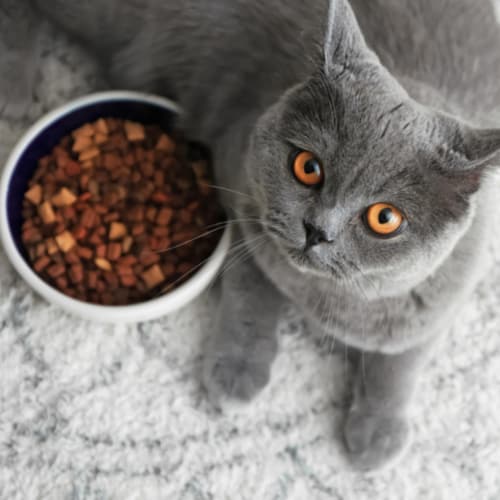
If food allergies or intolerances are suspected, your vet may suggest a hypoallergenic diet. These diets contain novel protein sources or hydrolyzed proteins that are less likely to trigger an allergic reaction.
For cats that eat too quickly or have sensitive stomachs, smaller, more frequent meals may help reduce vomiting. You can also try using puzzle feeders or slow-feeding bowls to encourage slower eating and better digestion.
Medication
The following are some medicines that the vest may describe as a treatment for your cat's recurring vomiting:
Antiemetics
Antiemetic drugs, such as maropitant or metoclopramide, can help control vomiting by blocking the stimulation of the vomiting center in the brain.
Antacids
If your cat's vomiting is due to stomach acid irritation, your vet may prescribe antacids like famotidine or omeprazole to reduce acid production and soothe the digestive tract.
Antibiotics
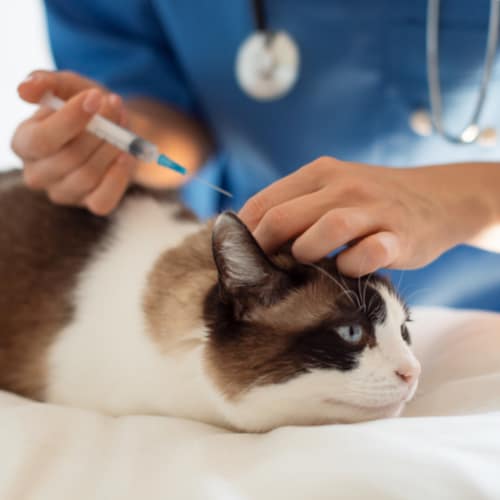
In cases of bacterial infections, such as gastroenteritis, antibiotics may be necessary to eliminate the harmful bacteria causing the vomiting.
Anti-inflammatory Drugs
For cats with inflammatory bowel disease or other inflammatory conditions, your vet may prescribe anti-inflammatory medications, such as corticosteroids or immunosuppressants, to reduce inflammation and alleviate symptoms.
Surgery (in severe cases)
In rare instances, such as when a foreign object is causing an obstruction or a tumor is present, surgery may be necessary to remove the obstruction or affected tissue.
Your veterinarian will work with you to determine the most appropriate treatment plan for your cat based on the diagnosis and severity of their condition.
Prevention Strategies
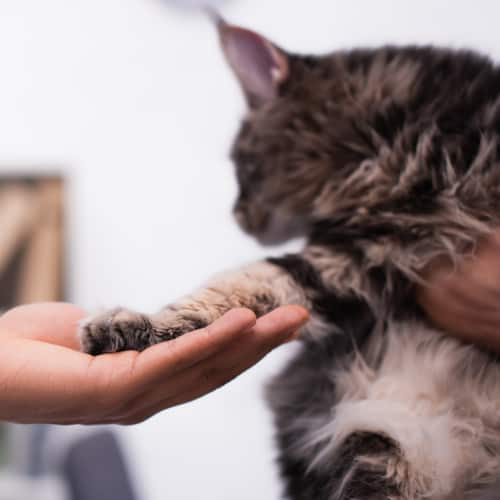
While treating the underlying causes of your cat's vomiting is crucial, preventing future episodes is equally important for their long-term health and well-being.
By implementing some simple prevention strategies, you can help keep your feline friend's digestive system running smoothly.
Proper Diet and Feeding Habits
Providing your cat with a high-quality, balanced diet appropriate for their age and health status is essential.
If your cat has a sensitive stomach, consider an easily digestible formula. Feed smaller, more frequent meals throughout the day to prevent overeating and reduce the risk of vomiting.
You may check out our article with reviews of Cat Foods For Sensitive Stomachs if you need help choosing your cat's food.
Determining the right amount and frequency of feeding is also crucial for your cat's well-being. For a comprehensive guide on cat feeding schedules and portion control, refer to our article on how often should you feed your cats.
Regular Grooming
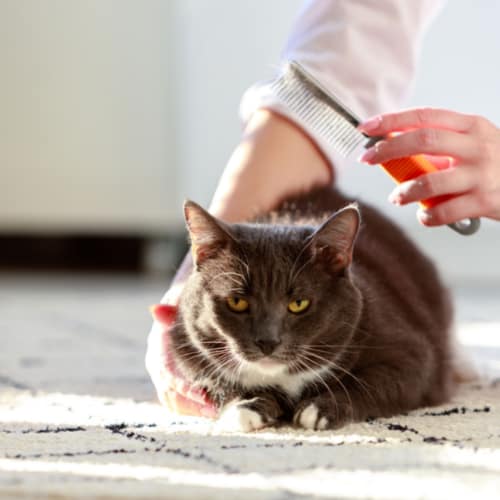
Brushing your cat's coat regularly helps remove loose fur and prevents excessive hairball formation. Long-haired cats may require more frequent grooming sessions.
If your cat struggles with hairballs despite regular brushing, ask your vet about hairball remedies or specialized diets.
Parasite Control
Keep your cat on a regular deworming schedule as recommended by your veterinarian. This helps prevent parasitic infections that can cause vomiting and other gastrointestinal issues.
Don't forget to keep your cat's living area clean and dispose of litter boxes and bedding that may harbor parasite eggs.
Minimizing Stress
Cats are sensitive to changes in their environment, and stress can lead to digestive upset.
Keep your cat's routine as consistent as possible, and provide a quiet, safe space for them to retreat to when feeling overwhelmed.
Also, introduce new foods, toys or household changes gradually to minimize stress.
Regular Veterinary Check-ups
Regular veterinary check-ups are crucial for maintaining your cat's overall health and well-being. These visits allow your veterinarian to detect potential health issues early on, increasing the chances of successful treatment. Learn more about how often you should take your cat to the vet in our article.
During these check-ups, your veterinarian will perform a physical examination, discuss your cat's diet and lifestyle, and recommend any necessary vaccinations or parasite control measures.
Frequently Asked Questions
As a cat owner, you likely have many questions about your feline friend's digestive health. Here are some common questions and answers to help you better understand and care for your cat when they experience vomiting episodes.
How can I tell if my cat is throwing up or coughing up a hairball?
Vomiting and coughing up hairballs can look similar, but there are some key differences.
When cats vomit, they typically heave and expel stomach contents, which may include undigested food, bile, or liquid.
Hairballs, on the other hand, are usually tubular in shape and consist primarily of matted fur.
Should I withhold food from my cat after they vomit?
In most cases, it's best to withhold food for 12-24 hours after a vomiting episode to allow your cat's stomach to settle.
However, always provide fresh, clean water to prevent dehydration. If vomiting persists or your cat shows signs of illness, consult your veterinarian.
Can a change in diet cause my cat to throw up undigested food?
Yes, sudden changes in your cat's diet can lead to digestive upset and vomiting.
When introducing a new food, do so gradually over 7-10 days, mixing increasing amounts of the new food with decreasing amounts of the old food to help your cat's digestive system adjust.
Is it normal for kittens to throw up more often than adult cats?
Kittens have more sensitive digestive systems and may vomit more frequently than adult cats. However, if your kitten experiences persistent vomiting, diarrhea, or other signs of illness, it's essential to consult your veterinarian promptly, as kittens can dehydrate quickly.
Can stress lead to my cat throwing up undigested food?
Absolutely. Cats are sensitive creatures, and stress can significantly impact their digestive health.
Changes in routine, new pets or family members or moving to a new home can all contribute to stress-induced vomiting.
Try to identify and minimize potential stressors in your cat's environment.
Remember, every cat is different, and what works for one may not work for another. Always consult your veterinarian for personalized advice about your cat's specific needs and health status.
Final Thoughts
Dealing with a cat that's throwing up undigested food can be stressful and concerning. By understanding the potential causes, knowing when to seek veterinary care, and implementing prevention strategies, you can help your feline friend maintain a healthy digestive system and improve their quality of life.
Your veterinarian is your greatest ally in ensuring your cat's health. Be open and honest about your cat's symptoms, diet, and lifestyle to help your vet develop a suitable treatment plan.
We hope you now know everything to pinpoint exactly what is causing your cat's discomfort. If you have further questions or comments, leave them in the comments section below.

